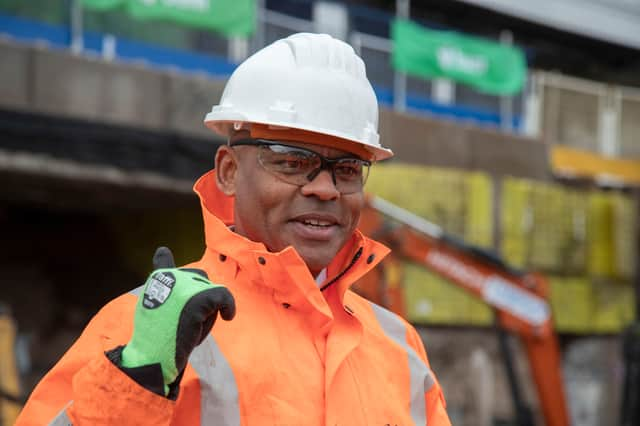Bristol mayor warns underground urgently needed to stop city 'grinding to a halt'


The mayor of Bristol has warned the city could “grind to a halt” unless a mass transit system with underground elements is delivered.
Rees was speaking to BristolWorld at the construction site of Bristol Temple Meads’ new £23m eastern entrance, which is part of the £94.7m Bristol Temple Quarter programme.
Advertisement
Hide AdAdvertisement
Hide AdHe said Temple Meads must act as a “cross-point for a mass transit system,” with its eastern entrance set to welcome its first rail travellers in late 2026.
Rees also warned against a mass transit system that is fully overground, saying this would lead to road closures.
But West of England Combined Authority (WECA) mayor Dan Norris, who also attended the eastern entrance site visit, said an overground transit system is what is needed and that road closures are manageable.
Rees told BristolWorld: “The renovation of Temple Meads Station will be future-proofed and part of that future-proofing must involve its ability to act as a hub, a cross-point for a mass transit.
Advertisement
Hide AdAdvertisement
Hide Ad“Delivering that mass transit system has to involve underground in the densest part of Bristol if you’re going to avoid having to close Gloucester Road, Church Road and St Luke’s (Road), to make a tram go up and down those roads.
“The sheer thought of laying rails up and down Gloucester Road and closing that road for two years means that a 100 per cent overground is just not deliverable.”
“We have to future-proof this site so it is available to whatever that technology is that we put in place for a mass transit system that the city urgently needs.”
He added: “We’ve got transport problems now, our transport system is low in levels of resilience so we need to build up that resilience, strength and quality of that offer. If we’re not, we’re just going to grind to a halt.”
Advertisement
Hide AdAdvertisement
Hide AdNorris vetoed plans for a tube-style underground at a meeting last month. WECA has also estimated the cost of an underground to be £18bn.
But Rees has said the costs are more likely to be between £4-7bn, due to underground sections not being needed on the full route.
Norris has said an underground railway is “unaffordable and unrealistic” and is instead pursuing overground options.
Speaking to BristolWorld, Norris added: “Lots of cities have produced fantastic public transport systems. A good example of our experience is what’s happened in Manchester where originally they were talking about an underground system but for very good reasons they’ve got a fantastic tram system now.
Advertisement
Hide AdAdvertisement
Hide Ad“And yes, you do have to close roads I’m afraid but they’ve managed to handle and deal with that very effectively, not affecting trade or commerce in any way. Obviously there'll be some challenges but if you manage it probably, you can make progress quite well.
“Manchester’s coming on leaps and bounds. I will make sure that Bristol and the West of England is even better than them, so we’re going to be pursuing what’s right for us and in my view that’s an overground public transport system that meets the needs of all our people.”
Comment Guidelines
National World encourages reader discussion on our stories. User feedback, insights and back-and-forth exchanges add a rich layer of context to reporting. Please review our Community Guidelines before commenting.